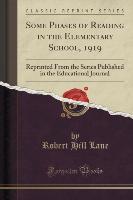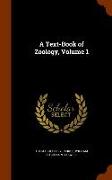Some Phases of Reading in the Elementary School, 1919
BücherAngebote / Angebote:
Excerpt from Some Phases of Reading in the Elementary School, 1919: Reprinted From the Series Published in the Educational Journal
Because the Educational Journal is largely a principals' magazine, this article is addressed primarily to the elementary principal who desires to attack the problem of reading in his school. As far as possible, the writer wishes to put this into the form of a friendly talk rather than in the form of a finished essay, so that while we may lose something in the way of style, we may, perhaps, gain thereby in directness and simplicity.
First of all, I should impress on the teachers of your building that reading is the most important subject with which we have to deal in the elementary school. Unfortunately, there is a tendency in this city, as well as elsewhere, to measure a child's progress, if not actually to decide upon his fitness for promotion, by his ability in arithmetic. Now, while arithmetic is a highly important subject, and merits our best attention, it is altogether conceivable that men and women may get along successfully in life with only a modicum of arithmetical skill. Indeed, the average person in adult life has little use for anything but the simple fundamental processes of addition, subtraction and multiplication, while reading functions to an enormous degree in the affairs of every day life, not only in conducting the affairs of the working day, but in the right employment of one's leisure. Hence, the position of so many teachers that reading as a subject, is of relatively little importance beyond the first and second grades is hardly a tenable one.
In the next place, I should point out to the teachers that reading is an extremely complex subject, and one which is exceedingly hard to teach. Nothing is easier than to distribute readers to a class and to call upon the individual members to read in turn with an occasional criticism by the teacher. Such a lesson could hardly be called a reading lesson, but it is considered so in unfortunately too many cases. Again, there is a lack of clear understanding that reading must be considered both from the standpoint of silent reading and oral reading. Many teachers regard reading as synonymous with oral reading, neglecting entirely the wide field of silent reading. In the elementary school, it is indeed necessary to devote considerable time to oral recitations in reading, but the time given to oral reading should decrease from lower grades to higher grades, and the time given to silent reading increased from grade to grade until in the higher grades of the elementary school silent reading should receive most attention. In adult life, one's oral reading demands relatively an insignificant portion of our time, while silent reading for information or for pleasure is an indispensable part of daily life.
Then, too, reading is complex in that the attempt to analyze a reading situation is not an easy task. To discover why a child fails in reading and to prescribe an adequate remedy calls forth the best skill which the teacher possesses, a task which is complicated by the truth that there is no panacea for poor reading, but every case, in a very real sense, must be judged upon its own merits.
About the Publisher
Forgotten Books publishes hundreds of thousands of rare and classic books. Find more at www.forgottenbooks.com
This book is a reproduction of an important historical work. Forgotten Books uses state-of-the-art technology to digitally reconstruct the work, preserving the original format whilst repairing imperfections present in the aged copy. In rare cases, an imperfection in the original, such as a blemish or missing page, may be replicated in our edition. We do, however, repair the vast majority of imperfections successfully, any imperfections that remain are intentionally left to preserve th
Folgt in ca. 5 Arbeitstagen

